Property: New code for new homes

Ninety four per cent of new build customers report at least one defect after they move into their home, according to a poll of homeowners in England by the Home Builders Federation. Poor plastering, bad brickwork pointing and damaged windows are the most commonly reported complaints.
In the past 15 years, the number of complaints has almost doubled. The average new home has over 150 defects – and stories of “our new build nightmare” have become regular articles in the local and national press.
To protect customers, the UK Government is introducing a new code of practice and an ombudsman scheme. The code and scheme will apply to all private customers buying a new home for owner-occupation anywhere in the UK.
What is the new code of practice?
The new code of practice – the New Homes Quality Code – was published in December 2021.
The Code aims to improve the quality of new-build homes and strengthen customer protections. Every aspect of a new home purchase is covered: starting when a customer walks into a sales office; continuing through missives and completion; ending with a strong after-sales and complaints system for two years after completion.
It will influence all stages of purchasing, moving in and living in a new home.
What does the Code cover?
The Code is split between “fundamental principles” and “practical steps”.
Principles include fairness, safety, quality, service, responsiveness, transparency, independence, inclusivity, security and compliance. Practical steps – mandatory requirements which must be followed – include:
- protecting vulnerable customers, banning high-pressure selling and requiring any deposits to be protected;
- requiring developers to provide relevant information such as factoring charges (both current and future) upfront;
- requiring fair reservation agreements, including a “cooling-off” period for a customer to change their mind about buying a new home;
- giving customers the right to appoint an inspector to carry out a pre-completion inspection of their home;
- stopping housebuilders from selling “incomplete” homes, as all homes must be “complete” before a customer moves in;
- strengthening requirements for developers to provide a strong after-sales service and complaints process, with the option of referring a complaint to an independent New Homes Ombudsman Service.
Who created the Code?
The Code was created by the New Homes Quality Board (“NHQB”).
What is the New Homes Quality Board?
The NHQB is an independent not-for-profit body established by the UK Government in January 2021. The NHQB developed the new Code and has overseen the appointment of a New Homes Ombudsman Service (“NHOS”).
What is the New Homes Ombudsman Service?
Currently, if a customer has a complaint, they may have to deal with different organisations.
If the complaint is about the quality of the home, and the customer is not happy with the housebuilder’s response, the customer can complain to its warranty provider, e.g. NHBC. But, if the complaint relates to the service provided by the housebuilder, the customer may have to complain separately under the Consumer Code for Home Builders’ Independent Dispute Resolution Scheme.
A customer may not realise whether their complaint is about quality or service. It would be better for customers to raise a complaint with one party rather than determine who should deal with a complaint.
In the future, customers buying a new home who are not happy with the quality of their home, or the service provided by the housebuilder, will approach the NHOS for all complaints.
Who will run the NHOS?
NHQB has appointed Dispute Service Ltd as its preferred partner to manage the new service. Dispute Service Ltd already deals with disputes concerning Safe Deposit Scotland (and the Tenancy Deposit Scheme in England), and deals with more than 20,000 disputes each year.
When does the NHOS launch?
The NHOS will launch later this year (estimated Q2 2022). Further details as to how it will operate will be published by the NHQB and Dispute Service Ltd shortly.
What do lawyers need to know about the new Code?
Standard documents will need to be reviewed to reflect the Code.
This will include reservation forms, standard offers, completion procedures, and documents on the developer’s side. For example, offers will need to refer to the customer’s right for a pre-completion inspection, and entry dates will need to reflect the requirement to carry out the inspection and review any findings.
On the customer’s side, the customer’s lawyer should be aware of the changes to the reservation forms, including the customer’s right to change their mind after signing. This would be important if a developer failed to provide information upfront and a customer wished to exercise their opportunity to terminate the reservation.
As part of the handover, the customer’s lawyers should also be aware of the pre-completion inspection and the requirements on developers to ensure that a home is “complete”. Developers should not be offering incentives, such as cash payments, for customers to move into homes that may, for example, only have a temporary electricity connection rather than a permanent mains supply.
After the handover, lawyers assisting with any complaints should know the timescales for housebuilders responding to complaints and the customer’s right to speak to the NHOS to resolve any issues or delays.
When will the new Code take effect?
Developers will be expected to register with the NHQB by 31 December 2022.
Will customers be automatically covered by the Code from 31 December 2022?
No. Registration does not automatically mean that a developer will apply the Code. There is a two-step process. The first step is registration, and this will take place by the end of the year. After a housebuilder is registered, the housebuilder has time to complete a transition period to ensure all training, processes, and marketing materials are in place. The housebuilder can then activate its membership with NHQB, which may be in phases, for example by division or location. Once activated, customers reserving new homes from that date will be covered by the NHQC and the NHOS.
Will housebuilders delay activating the new Code?
I believe this is unlikely. Responsible housebuilders welcome the new Code and its benefits to customers. The Springfield Group is committed to registering mid-2022. There will be a strong market demand for housebuilders to move to the new Code.
Equally, there is a strong economic case for moving to the new Code. Housebuilders must pay the annual registration fee for the Code from the point that they register. Developers will avoid paying for two systems at once by activating the new Code.
Where can I find out more about the Code and the NHOS?
The Code and NHOS are being introduced under the Building Safety Bill, which had its second reading in February 2022, and which, for the sections dealing with the Code and NHOS, will apply to the whole of the UK.
You can find more information about the Code from the New Home Quality Board website including copies of the Code, FAQs, developer information and more.
Is there anything we don’t know yet?
Yes, we need to know more about the New Homes Ombudsman Service.
Will the Code and the NHOS improve the way new homes are bought and sold?
Absolutely. Everyone deserves a decent home, and any steps we take either as a housebuilder or as an industry to improve standards and service benefits all new build customers.
Perspectives
Features
Briefings
- Civil court: Redaction – completing the picture
- Corporate: Pandemic procurement: proper preferences?
- Intellectual property: NFTs and IP rights
- Agriculture: latest from the Land Court
- Succession: Changes to reporting for excepted estates
- Sport: Fan pressure and questions of morality
- Property: New code for new homes
- In-house: Democracy behind the scenes







